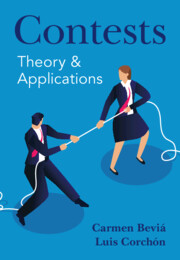5 - Contests between Groups
from Part II - Extensions
Published online by Cambridge University Press: 30 May 2024
Summary
Chapter 5 explores contests among groups, focusing on free-riding issues and the efficacy of group sizes. It also looks at how shares of victory spoils affect contestants’ behavior. Influenced by Mancur Olson’s seminal 1965 work, The Logic of Collective Action, the chapter discusses how stable societies accumulate interest groups. These groups shape government policies, potentially restricting economic growth. The defeat of Germany and Japan in World War II dismantled their key interest groups, unlike in the United Kingdom and the United States, where these groups gained prestige and fueled crony capitalism. The chapter explores how small interest groups can gain significant influence. Olson attributes this to “free riding of effort” in large groups, arguing that smaller groups exert more effort, explaining their success. However, as this chapter discusses, the validity of this assumption depends on several factors, including the nature of the prize – whether it is a private or public good – and the costs associated with exerting effort.
Keywords
- Type
- Chapter
- Information
- ContestsTheory and Applications, pp. 65 - 79Publisher: Cambridge University PressPrint publication year: 2024

